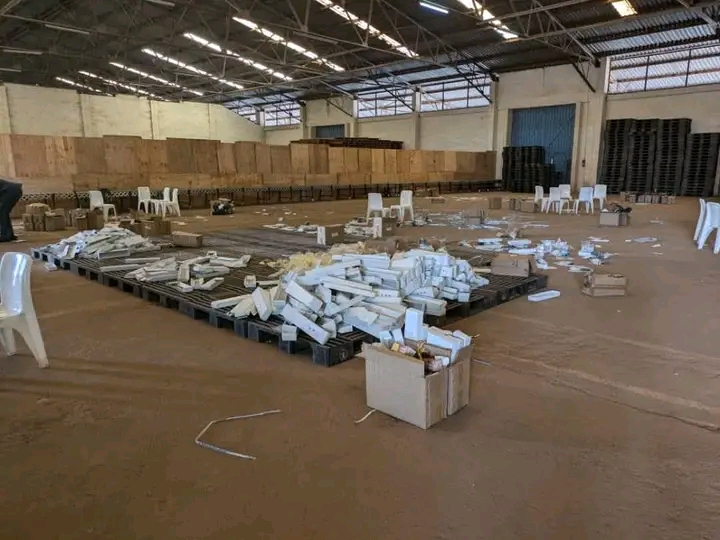By Twink Jones Gadama
In a nation already grappling with socio-political tensions, Malawi finds itself at a critical juncture as allegations of voter registration irregularities surface, raising fears of potential civil unrest and even genocide.
The recent discovery of voter registration cards at the National Food Reserve Agency (NFRA) warehouse has ignited a firestorm of controversy, with opposition parties demanding accountability and calling for the resignation of Malawi Electoral Commission (MEC) chairperson Anabel Tembo.
As the country approaches a pivotal election, the integrity of the electoral process hangs in the balance, and the implications for national stability are dire.
The situation in Malawi is precarious. The country has a history of political strife, and the current climate is no exception.
Reports of violence, intimidation, and suppression of dissent have become increasingly common, particularly as the election date draws near.
The discovery of voter registration cards in a government warehouse has only exacerbated these tensions, leading many to question the legitimacy of the electoral process.
The fact that these cards were found in a location associated with the NFRA, an agency tasked with managing food security, raises serious concerns about the motives behind their storage and the potential for manipulation of the electoral process.
Opposition parties have been quick to seize upon this revelation, demanding an immediate investigation into the circumstances surrounding the discovery of the voter registration cards.
They argue that the presence of these cards in a government warehouse is indicative of a broader scheme to undermine the electoral process and disenfranchise voters.
The director of the NFRA, however, has dismissed these concerns, claiming that it is “normal” for such documents to be stored in their facilities.
This assertion has done little to quell the outrage among opposition leaders and civil society groups, who view it as a blatant attempt to obfuscate the truth.
The fact that the voter registration cards were predominantly from Lilongwe, the capital city, adds another layer of complexity to the situation.
Lilongwe is a political stronghold for the opposition, and the discovery of these cards in a government facility raises suspicions of targeted disenfranchisement. Critics argue that the government may be attempting to manipulate the voter registration process to favor the ruling party, thereby undermining the democratic process and paving the way for potential civil unrest.
As tensions mount, calls for Anabel Tembo’s resignation have intensified.
Critics argue that her leadership of the MEC has been marked by a lack of transparency and accountability, and they contend that her continued tenure poses a significant threat to the integrity of the electoral process.
The MEC has faced scrutiny in the past for its handling of voter registration and election logistics, and the current crisis has only amplified these concerns.
Many believe that a change in leadership is necessary to restore public confidence in the electoral process and ensure that the upcoming elections are free and fair.
The implications of these developments extend beyond the immediate political landscape.
Malawi is a nation that has faced its share of challenges, including poverty, corruption, and social inequality.
The potential for civil unrest in the wake of these allegations is a chilling prospect, particularly given the country’s history of violence during politically charged periods. The specter of genocide looms large, as ethnic and political divisions threaten to fracture the social fabric of the nation.
The international community is watching closely, and there are growing concerns that a failure to address these issues could lead to a humanitarian crisis.
In light of these developments, it is imperative that the MEC and the government take immediate action to address the allegations of voter registration irregularities.
Transparency and accountability must be prioritized to restore public trust in the electoral process.
An independent investigation into the discovery of the voter registration cards is essential, and the findings must be made public to ensure that the concerns of opposition parties and civil society are taken seriously.
Furthermore, the government must engage in dialogue with opposition leaders and civil society organizations to address the underlying issues that have contributed to the current climate of distrust and fear.
A collaborative approach is necessary to foster a sense of unity and shared purpose among the diverse political factions in Malawi.
The stakes are high, and the potential consequences of inaction are dire.
As Malawi stands on the precipice of a potentially explosive electoral cycle, the need for vigilance and accountability has never been more urgent.
The discovery of voter registration cards in a government warehouse is a troubling sign of the challenges that lie ahead, and the response of the MEC and the government will be critical in determining the course of the nation.
The people of Malawi deserve a fair and transparent electoral process, and it is incumbent upon their leaders to ensure that this fundamental right is upheld.
The situation in Malawi is fraught with uncertainty, and the allegations of voter registration irregularities have the potential to ignite a crisis that could have far-reaching consequences. The calls for Anabel Tembo’s resignation reflect a growing frustration with the status quo, and the need for change is palpable. As the nation grapples with these challenges, it is essential that all stakeholders come together to prioritize the integrity of the electoral process and work towards a peaceful and democratic future. The eyes of the world are upon Malawi, and the time for action is now.




